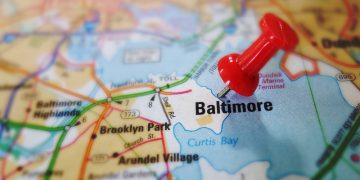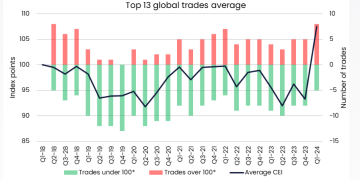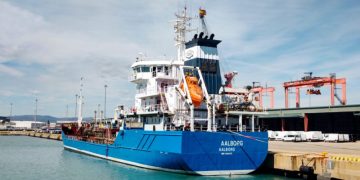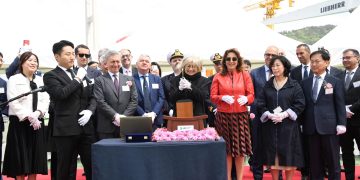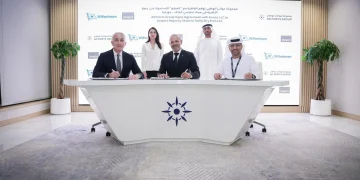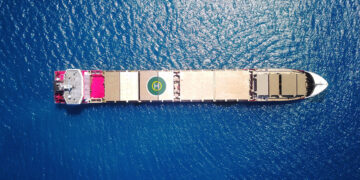The Mærsk Mc-Kinney Møller Center for Zero Carbon Shipping published its second research paper in its Onboard Vessel Solutions series, focusing on reducing methane emissions onboard vessels.
Liquefied electro- and bio-methane have been identified by the Mærsk Mc-Kinney Møller Center for Zero Carbon Shipping (MMMCZCS) as potential low-emission alternative fuel pathways.
In addition, given the rapid expansion of the LNG-fueled vessel fleet and industry projections, the use of LNG as a fuel for the maritime industry will continue well into the future. The use of these methane-based fuels, however, present both a regulatory compliance and climate risk related to onboard vessel methane emissions, in particular methane slip from internal combustion engines, that increases a vessel’s overall CO2-equalivent (CO2-eq) emissions.
Potential and upcoming regulation of onboard vessel methane emissions presents a risk for methane-based fueled vessel owners, operators, and charterers.
said MMMCZCS.
While CO2 is the main source of shipping’s climate impact with over 90% of total greenhouse gas (GHG) emissions, methane has a higher climate impact in terms of global warming potential (GWP). As a result, methane emission reduction can be an efficient way to reduce a vessel’s overall CO2-eq emissions, allowing compliance with upcoming regulations and increasing the viability and competitiveness of methane-based alternative fuel pathways.
A dedicated MMMCZCS working group was established to study reducing methane emissions onboard vessels, which is one vessel specific emission-related consideration for methane-based alternative fuel pathways. Based on its results, the following conclusions have been made:
#1 A vessel’s total methane emissions should be considered: While the main source of onboard vessel methane emissions is methane slip from main and auxiliary internal combustion engines, total methane emissions of a vessel is highly dependent on a vessel’s operations, system dimensioning, machinery configurations and connected technologies. In addition to selecting baseline engine and potential after-treatment technologies, system solutions can significantly reduce onboard vessel methane emissions.
#2 Cost-efficient onboard vessel methane emission reduction is possible but limited for existing vessels: For the vessels studied, onboard methane emissions can be cost-efficiently reduced by 40-80% for a newbuild and 20-50% for an existing vessel through the selection of baseline engine technologies and the use of after-treatment technologies and system solutions. These reductions translate to onboard methane emissions being reduced from 7-14% of total tank-to-wake (TTW) GHG emissions to 2-8% for a newbuild and 4-12% for an existing vessel. Cost efficiency is considered as being less than the forecasted cost of bio-methane and is associated with CO2-eq abatement cost of less than about $200/tonCO2-eq. Ship owners should carefully consider onboard methane emission reduction at the newbuild phase to avoid potential costly modifications later in the vessel’s lifetime. While it is technically feasible to further reduce onboard vessel methane emissions beyond these levels, utilizing other options like the use of low-emission fuels could be more cost-efficient if further GHG emission reductions are required.
#3 Reducing onboard vessel methane emissions are needed to increase viability of electro- and bio-methane fuel pathways: Reducing onboard vessel methane emissions to these cost-efficient levels increases the longer-term viability of the electro- and bio-methane fuel pathways, however, it is still unclear if upstream well-to-tank fugitive emissions can be reduced to acceptable levels. Using the FuelEU methodology and cost-efficient onboard methane emission reduction measures, GHG WTW emissions can be reduced to 5-9 gCO2eq/MJ using 100% electro-methane and hydrothermal liquefaction (HTL) Oil as a pilot fuel (a 90-95% decrease relative to heavy fuel oil).
#4 Proposed FuelEU for Maritime limits are not strict enough to activate onboard vessel methane emission reduction: For the vessels studied, GHG emission levels are already compliant with the 2025 and 2030 FuelEU GHG intensity index limits without introducing any onboard vessel methane emission reduction measures. This is due to LNG’s lower CO2 emission factor used within its 100-year GWP methodology. If a CO2-eq regulation with the proposed FuelEU limits is introduced, no emission reduction actions would be needed until 2035.
#5 Regulation is required for widespread adoption of onboard vessel methane emission reduction technologies and solutions: Without strong incentives or regulatory requirements to reduce methane emissions, there is limited commitment from ship owners to adopt methane emission reduction technologies and solutions. There are ongoing discussions at the IMO to include methane into its LCA methodology, a CO2-eq approach like FuelEU. There is also the possibility that methane is regulated in a more direct way using a vessel’s Technical File like NOX emissions. This type of regulation could more directly target methane slip levels and the need to reduce them onboard the vessel either for newbuilds or existing vessels if retroactive.




